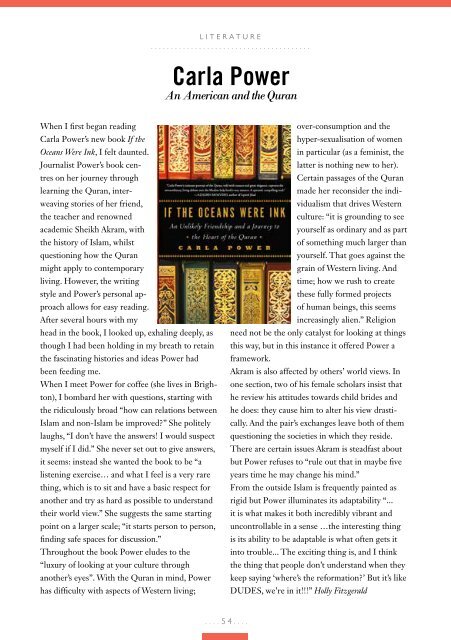Viva Brighton Issue #36 February 2016
Create successful ePaper yourself
Turn your PDF publications into a flip-book with our unique Google optimized e-Paper software.
literature<br />
........................................<br />
Carla Power<br />
An American and the Quran<br />
When I first began reading<br />
Carla Power’s new book If the<br />
Oceans Were Ink, I felt daunted.<br />
Journalist Power’s book centres<br />
on her journey through<br />
learning the Quran, interweaving<br />
stories of her friend,<br />
the teacher and renowned<br />
academic Sheikh Akram, with<br />
the history of Islam, whilst<br />
questioning how the Quran<br />
might apply to contemporary<br />
living. However, the writing<br />
style and Power’s personal approach<br />
allows for easy reading.<br />
After several hours with my<br />
head in the book, I looked up, exhaling deeply, as<br />
though I had been holding in my breath to retain<br />
the fascinating histories and ideas Power had<br />
been feeding me.<br />
When I meet Power for coffee (she lives in <strong>Brighton</strong>),<br />
I bombard her with questions, starting with<br />
the ridiculously broad “how can relations between<br />
Islam and non-Islam be improved?” She politely<br />
laughs, “I don’t have the answers! I would suspect<br />
myself if I did.” She never set out to give answers,<br />
it seems: instead she wanted the book to be “a<br />
listening exercise… and what I feel is a very rare<br />
thing, which is to sit and have a basic respect for<br />
another and try as hard as possible to understand<br />
their world view.” She suggests the same starting<br />
point on a larger scale; “it starts person to person,<br />
finding safe spaces for discussion.”<br />
Throughout the book Power eludes to the<br />
“luxury of looking at your culture through<br />
another’s eyes”. With the Quran in mind, Power<br />
has difficulty with aspects of Western living;<br />
over-consumption and the<br />
hyper-sexualisation of women<br />
in particular (as a feminist, the<br />
latter is nothing new to her).<br />
Certain passages of the Quran<br />
made her reconsider the individualism<br />
that drives Western<br />
culture: “it is grounding to see<br />
yourself as ordinary and as part<br />
of something much larger than<br />
yourself. That goes against the<br />
grain of Western living. And<br />
time; how we rush to create<br />
these fully formed projects<br />
of human beings, this seems<br />
increasingly alien.” Religion<br />
need not be the only catalyst for looking at things<br />
this way, but in this instance it offered Power a<br />
framework.<br />
Akram is also affected by others’ world views. In<br />
one section, two of his female scholars insist that<br />
he review his attitudes towards child brides and<br />
he does: they cause him to alter his view drastically.<br />
And the pair’s exchanges leave both of them<br />
questioning the societies in which they reside.<br />
There are certain issues Akram is steadfast about<br />
but Power refuses to “rule out that in maybe five<br />
years time he may change his mind.”<br />
From the outside Islam is frequently painted as<br />
rigid but Power illuminates its adaptability “...<br />
it is what makes it both incredibly vibrant and<br />
uncontrollable in a sense …the interesting thing<br />
is its ability to be adaptable is what often gets it<br />
into trouble... The exciting thing is, and I think<br />
the thing that people don’t understand when they<br />
keep saying ‘where’s the reformation?’ But it’s like<br />
DUDES, we’re in it!!!” Holly Fitzgerald<br />
....54....


















